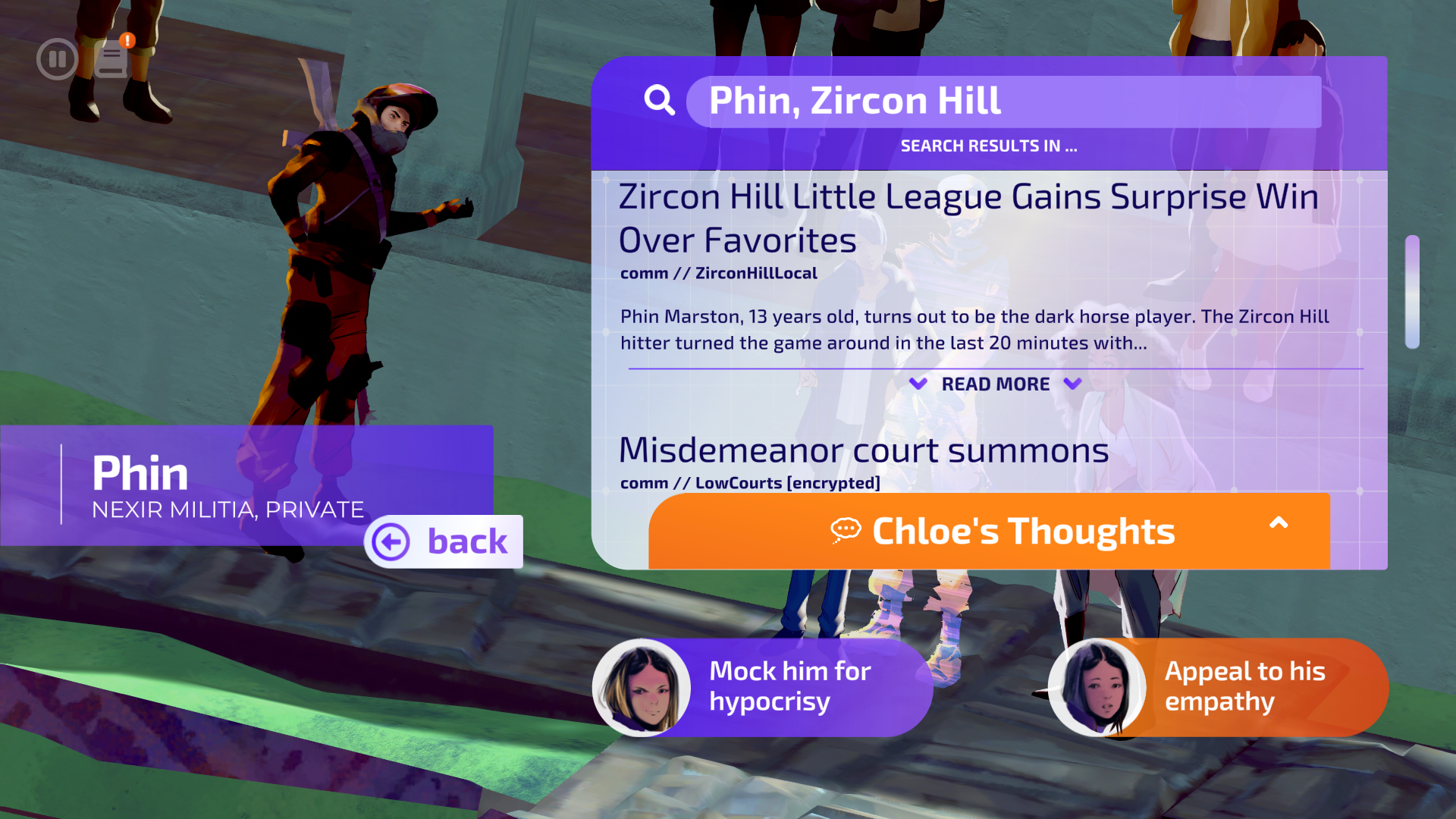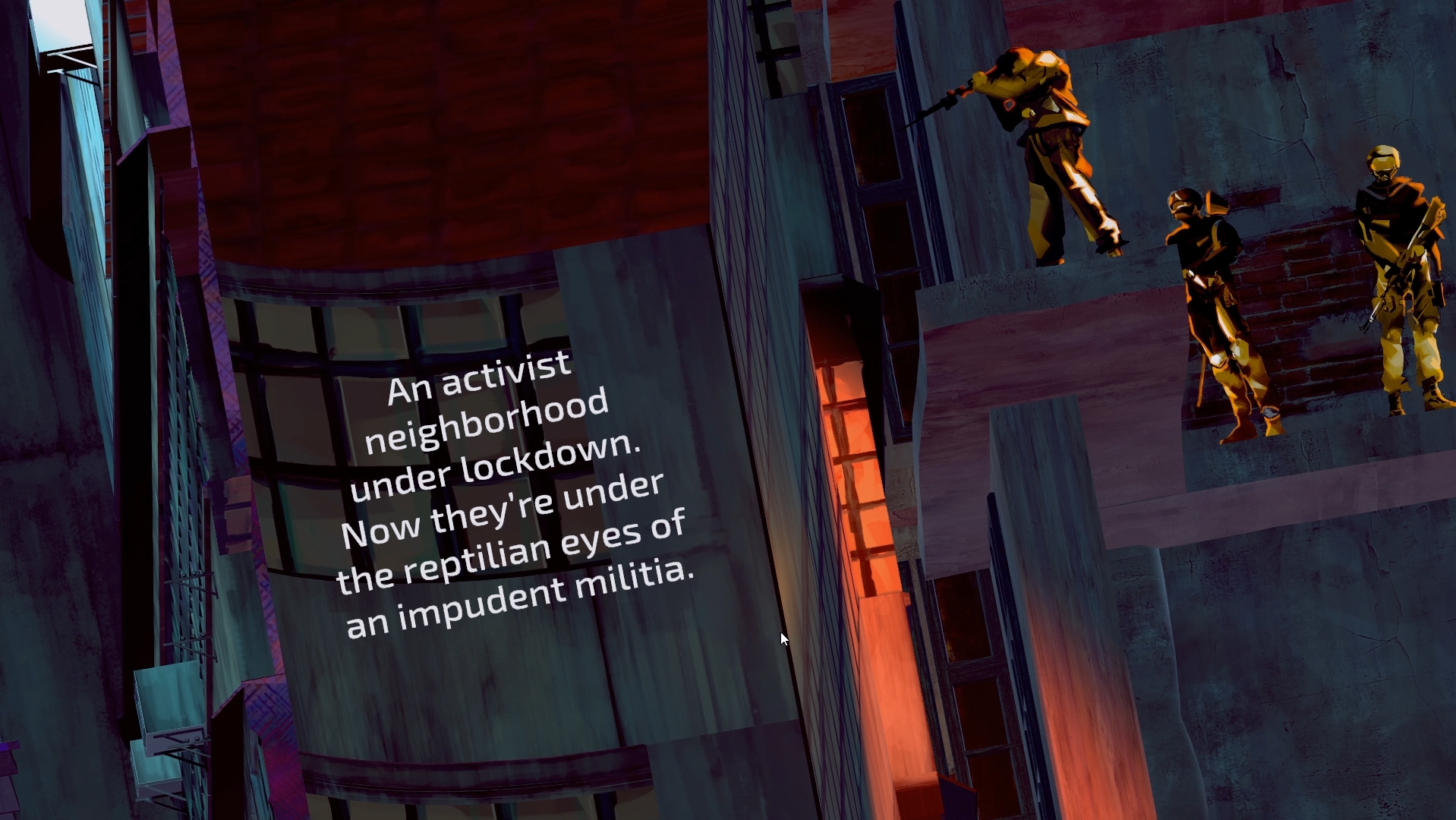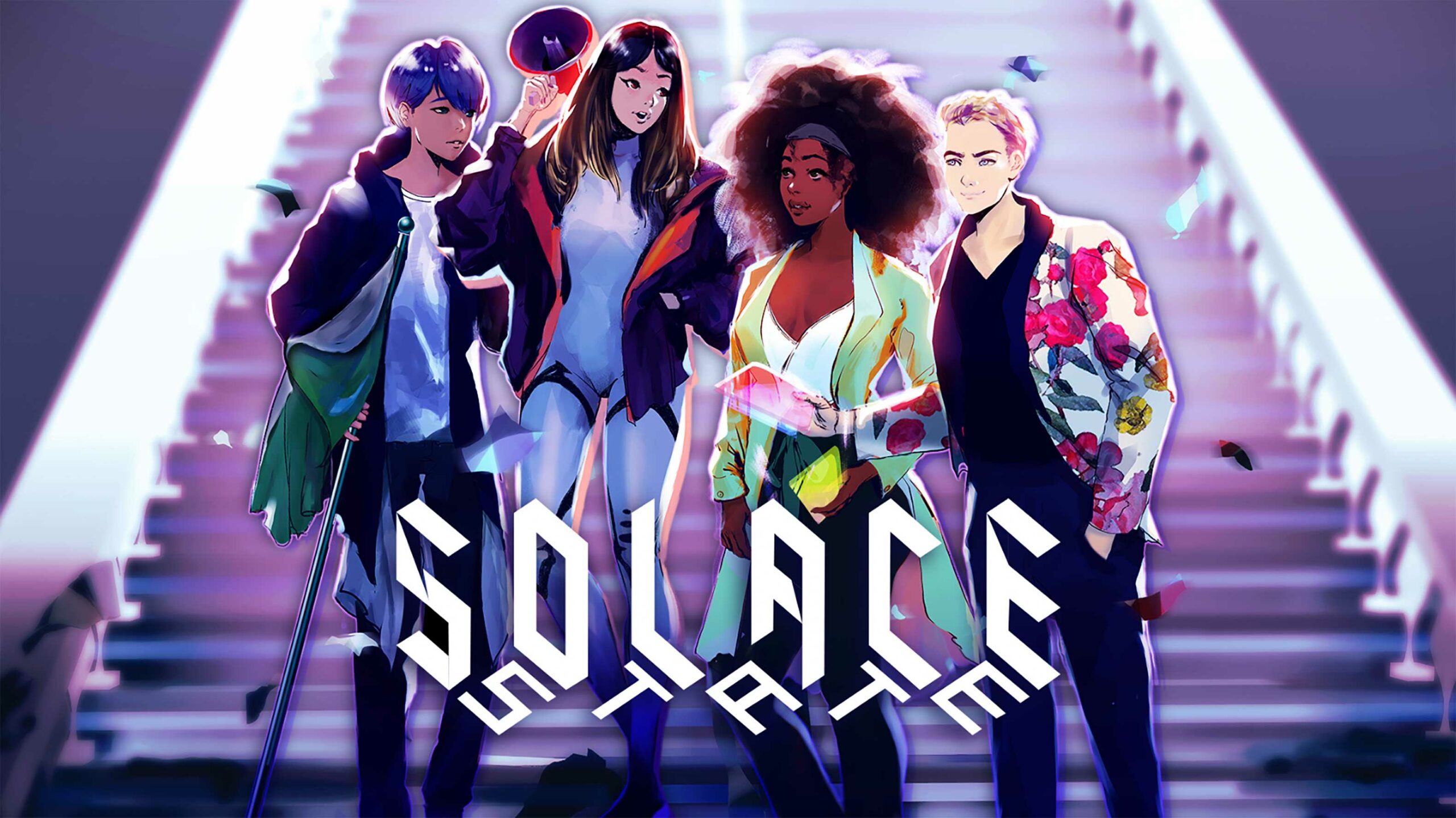
The cyberpunk genre is arguably more popular than ever.
Between TV shows and movies like Alita: Battle Angel, Altered Carbon and Blade Runner 2049, and games like Cyberpunk 2077, Citizen Sleeper and Final Fantasy VII Remake, we’ve seen all sorts of dystopian futuristic stories in the past several years.
But for Toronto-based indie developer Tanya Kan, there’s more to explore in the genre. As the executive producer and director at Vivid Foundry, she’s leading the charge on Solace State, an ambitious cyberpunk visual novel about a young hacker who rebels against the militarized biotech society of Abraxa.
Latest footage from cyberpunk & hopepunk visual novel @SolaceStateGame! Push back against repression.
Want more? Find me on:
Mstdn: https://t.co/SNVIdW3rFJ
Tumblr: https://t.co/j1YEzcQycR
IG: https://t.co/4yrdly4CuH
Tiktok: https://t.co/sPg1SooxiA https://t.co/XWEo7K4qdP— Tanya Kan 🌈 Solace State on sale at LudoNarraCon! (@VividFoundry) December 15, 2022
With Solace State, Kan wants to avoid a common trope found in other cyberpunk media: techno-Orientalism, in which East Asian aesthetics are co-opted to prop up the story.
“Early cyberpunk does have some really critical ideas, but at the same time, there’s sometimes this painting over of East Asia. It doesn’t talk about the diversity of East Asia, but it’s always the foreigner who comes in and that’s the emblem of diversity, and then everyone else is kind of more cookie-cutter,” she says. “The denizens who live in the cyberpunk world are often seen as manufactured; they don’t have their own motivations and agenda. So the main thing that we really want to pursue with Solace State is to show that these people come from all walks of life — their lives actually will go on. They have their own lives, their own trajectory. They have their own motivations and pains and fears and concerns and hopes.”
To achieve that, she’s centred the story around Chloe, a young woman who forms relationships with a diverse assortment of characters as part of her activism. It’s a premise that draws heavily from Kan’s own experiences in both political science and cinema studies. In particular, she credits a 2016 internship at a VFX studio in Hong Kong for inspiring her to create Solace State.
“[When] I was in East Asia, it was the precursor to a lot of movements in the U.S. around elections that were much more divisive. It was during the Obama period, and I found that people were actually very willing to talk about their political experiences,” she says, noting that this helped make her feel welcome. “I was definitely very pleasantly surprised by how many people are willing to share their opinions on people who are in power, for example, or people who should be in power. And that’s really quite nice to see.”
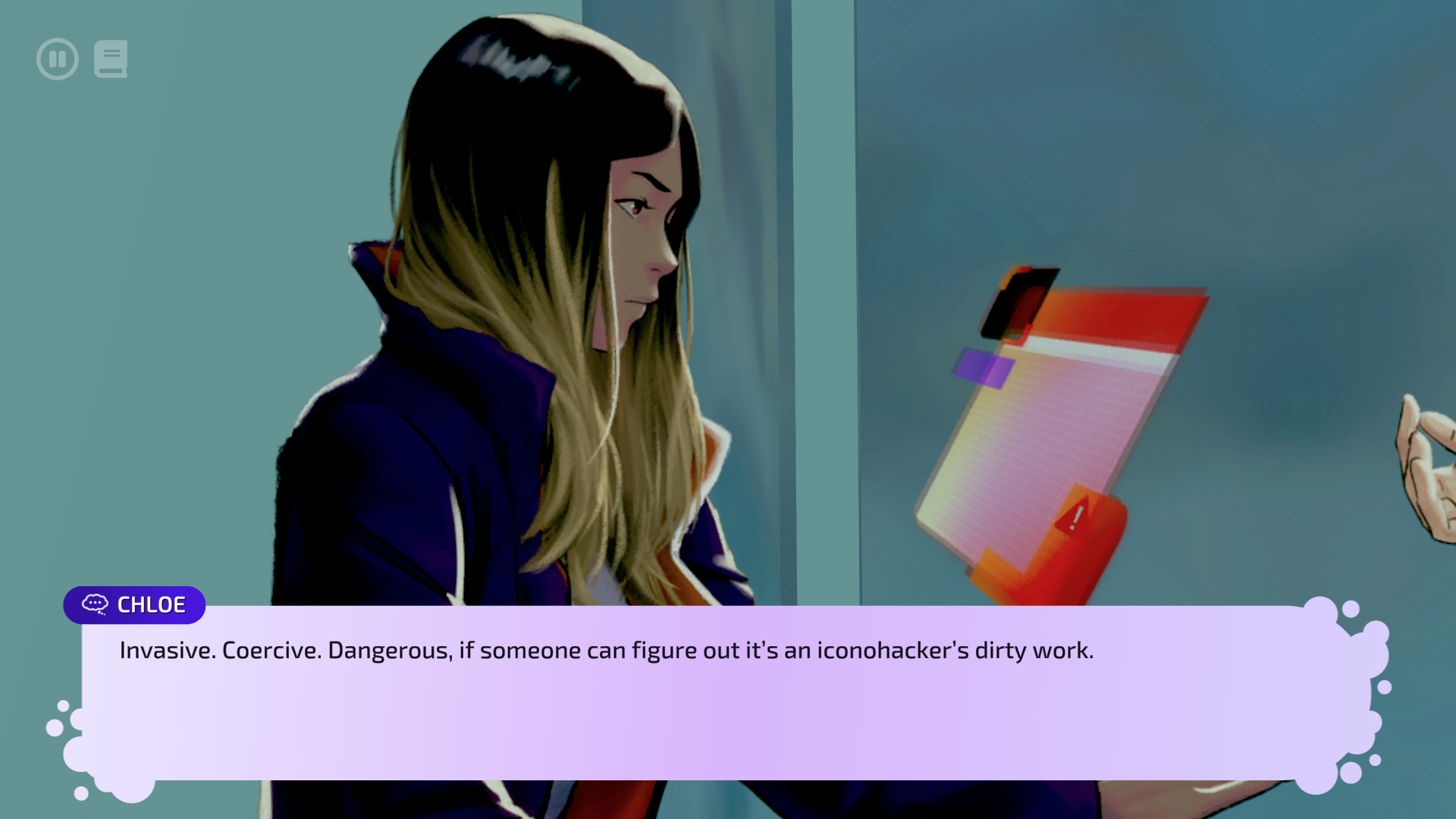 She says this openness extended to people from all walks of life, not just those with fellow political interests.
She says this openness extended to people from all walks of life, not just those with fellow political interests.
“Even if I had only Wikipedia-level readings of who’s who in East Asia, they’re very willing to expand and have that conversation with me. Not just a few sentences, but to go quite in-depth with the world that they want to see, which I was really happy to hear about […] And these are not people who have studied political science or anything.”
This helped lay the groundwork for what would become Solace State, and it’s easy to see how it materializes in the actual game. For example, a previously released demo showed Chloe and her friends speaking with one of the militia members. Through Chloe’s hacking skills, you can learn more about his background, which reveals him to be a flawed person with his own financial and medical issues, which, in turn, gives you some options in how you approach him.
On top of telling a cyberpunk story focusing on people’s different, yet nuanced, perspectives, Kan has made it even more personal by basing Chloe’s background on her own. Like Kan, Chloe is a queer Asian, which she says helps explore a side of cyberpunk that often goes unseen.
“This is about a young woman who tries to build a political will in a community, which, interestingly enough, you see all the time in real life. But that story is never told, as explicitly, I think in fiction,” she says. “A lot of the time, women characters tend to not have as much [of a voice] in such a large societal community; there’s not been as much of an emphasis on that. And when they do, they’re usually not coded as queer — they’re coded as more masculine.”
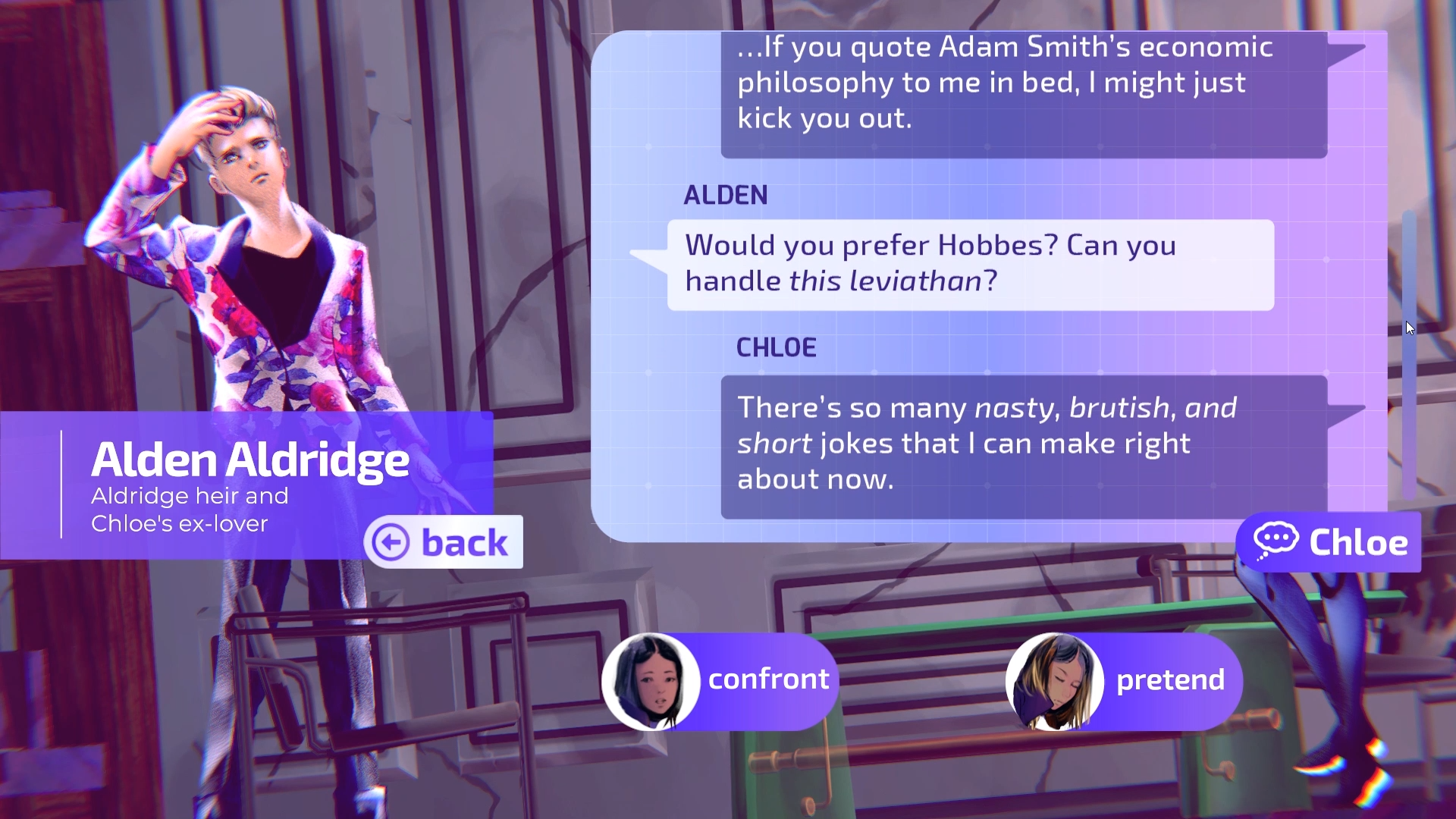 For Kan, this meant bringing in the “queerness of cyberpunk” — both in “having fun” with the more stylish, teched-out outfits Chloe can wear and by exploring the deeper significance behind the connections she makes. In speaking with these characters, you’ll have to make choices that will shape the outcome of the narrative, with each member of the cast having their own arc with multiple possible endings.
For Kan, this meant bringing in the “queerness of cyberpunk” — both in “having fun” with the more stylish, teched-out outfits Chloe can wear and by exploring the deeper significance behind the connections she makes. In speaking with these characters, you’ll have to make choices that will shape the outcome of the narrative, with each member of the cast having their own arc with multiple possible endings.
“These are people living on the fringes, they’re exploring what it means for themselves with potentially much less than the people in power. And what does that mean for their day-to-day lives? Who do they like? Who are they attracted to? All of it is intertwined,” she says. “And from the perspective of queerness, the definition that we’re taking with it is really not just about sexuality, but it’s how people live so that they can find an alternative solution to something that’s been enforced [on] them.”
Expanding the story
Of course, much has changed since Kan’s time in Hong Kong, and she says the events of the last several years have helped evolve Solace State‘s narrative.
“The core crux of it was always, ‘What does it mean to be like a person in society in the world and to find your people?’ That’s been unchanged. But there are just so many different ways of telling that, and the first time that really changed was, of course, the increasing divisiveness that we saw in the Western political world. And suddenly this game resonated with people in a different way. And I thought, ‘I’ve been raised pretty much my whole life in Canada, so I think I need to lean into my experience as a person within the geospheric space of understanding how fragile certain kinds of democratic institutions that we take for granted can be.”
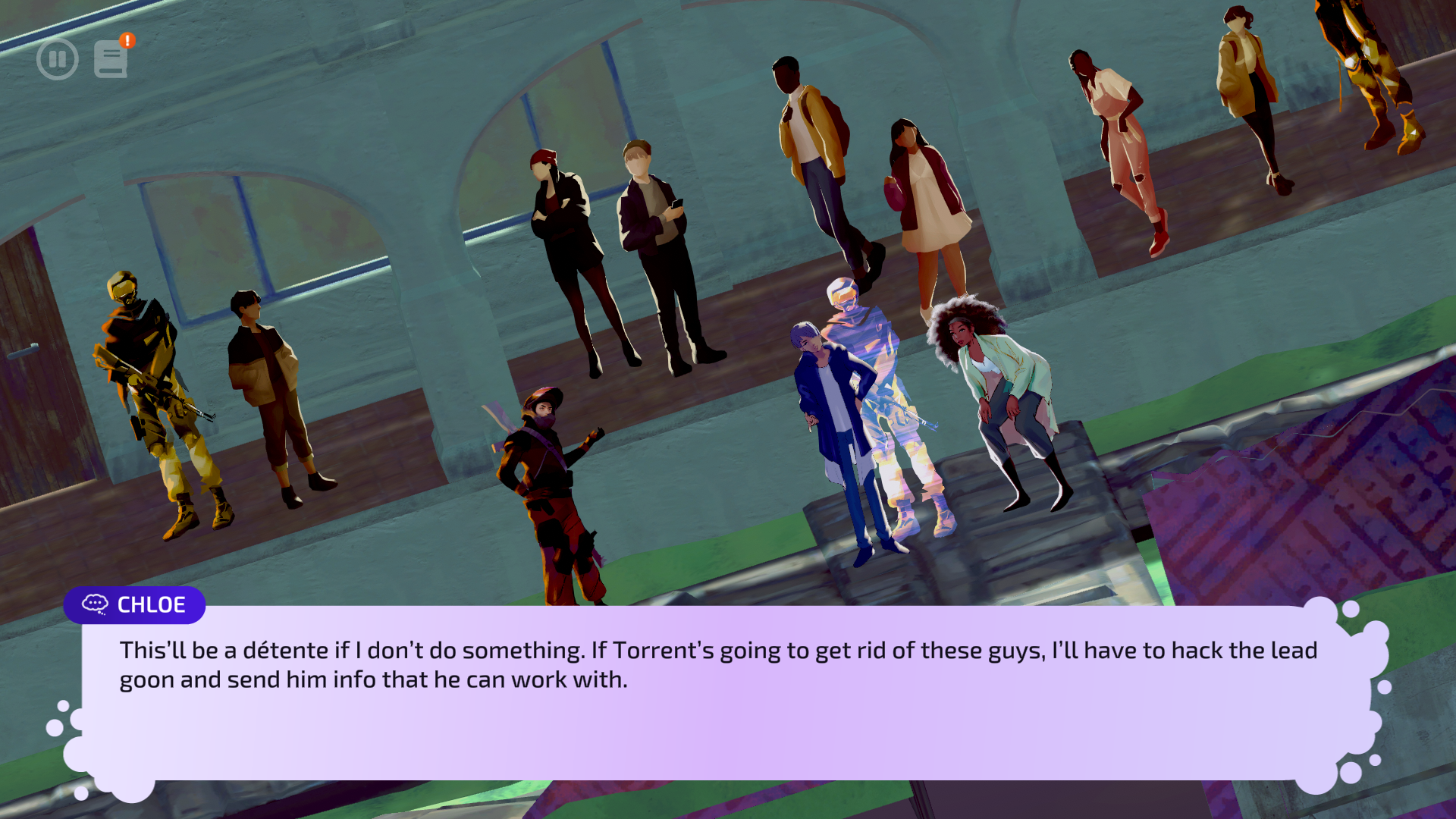 That began with watching a slew of documentaries on social movements, which she found informative, but, often, lacking the complete picture.
That began with watching a slew of documentaries on social movements, which she found informative, but, often, lacking the complete picture.
“I noticed that quite a lot of them actually ended on one successful protest and then they have this kind of intertitle at the end telling me, ‘in the next five years, such and such happened, and it was a very strong fight and unfortunately, even more lives were lost.’ And I was like, ‘it feels like there should be a sequel, right? That feels like that’s part of the story, and I really want to see beyond just that first movement.’ So I expanded the story by quite a bit.”
Two major events in May 2020 would only further broaden the narrative. First, there was the Ubisoft Indie Series, a competition in which the publishing giant behind the likes of Assassin’s Creed and Far Cry awards indie studios with prize money and development support. That year, Vivid Foundry took home top honours for Solace State, allowing Kan to bring on more people to work on the game.
On a more somber note, that month also saw the murder of George Floyd at the hands of a police officer. This resulted in widespread protests against anti-Black racism and police brutality, and Kan’s team was paying close attention.
“We definitely took a look at what they were critiquing in their protests,” she says. “And not just them, but just protests in general in the Western world, and taking a look at how police contributed to governing your space, and what different groups are saying about the safety of citizenship. We tried to represent different voices within that space — see what activists say, and consulted with some people about that.”
This is where the visual novel format, which incorporates a distinct blend of 2D and 3D to create an “uncanny” feeling, really comes into play. It allows Solace State to have a variety of scenes in which Chloe simply talks with people — like her friend Torrent, who helps arrange youth community housing — to reveal more of the psychological toll that these ongoing conflicts take on people.
The events of the past couple of years have also helped with the makeup of the team itself. Indeed, a quick perusal of Vivid Foundry’s website shows a studio that lives up to the diversity that Kan has been talking about. Besides Kan herself, there’s a solid mix of men, women and trans developers of different races, ethnicities and sexualities.
Besides helping to give more opportunities to marginalized folk, Kan says the diversity of the team had major benefits on the game itself.
“It very much keeps me humble all the time,” she admits. “They just come from such important perspectives and have certain nuances that I’m just not privy to […] I think having meetings with my team has really helped elucidate just different perspectives, which has been fantastic, because you’ll sometimes hear it reframed in completely different ways. They’ll like the way that we’re talking about certain character developments, romantic arcs, and so forth, but some people are like, ‘Oh, that doesn’t resonate with me, but what about this?’ And these folks don’t necessarily need to be like the writers on the team, but it’s still so important to hear because everyone’s just trying to contribute their best to the project and to see from the player’s perspective what would resonate with whom, and everyone takes that into account.”
It’s a full circle moment for Kan, whose interactions with different folks helped inspire the game in the first place all those years ago. But it’s also the sort of empathetic experiences that she hopes Solace State can help pass on to other people.
“To be curious about other people’s perspectives and to be curious about queerness — that it doesn’t have to be scary or anything. It’s actually, in fact, just part of the continuum of being curious and being open to new ideas,” she says of what she hopes players will take away from Solace State.”
And I mean this not as in the sexuality of queerness, but just queerness in general. Queer in different kinds of ways of thinking and ways of seeing. We really want this to be a game where when you play as Chloe, you can kind of see through her eyes — that you’re also making decisions about how your voice can impact the world. And so we hope that this actually is, in a way, not just cyberpunk, but ‘hopepunk.’ That people just find that there is hope in the world because they can find their own paths and have their voices feel like they’re being respected without being disrespectful to other voices.”
Solace State is set to release later this year on Steam and Xbox.
Image credit: Vivid Foundry
MobileSyrup may earn a commission from purchases made via our links, which helps fund the journalism we provide free on our website. These links do not influence our editorial content. Support us here.

